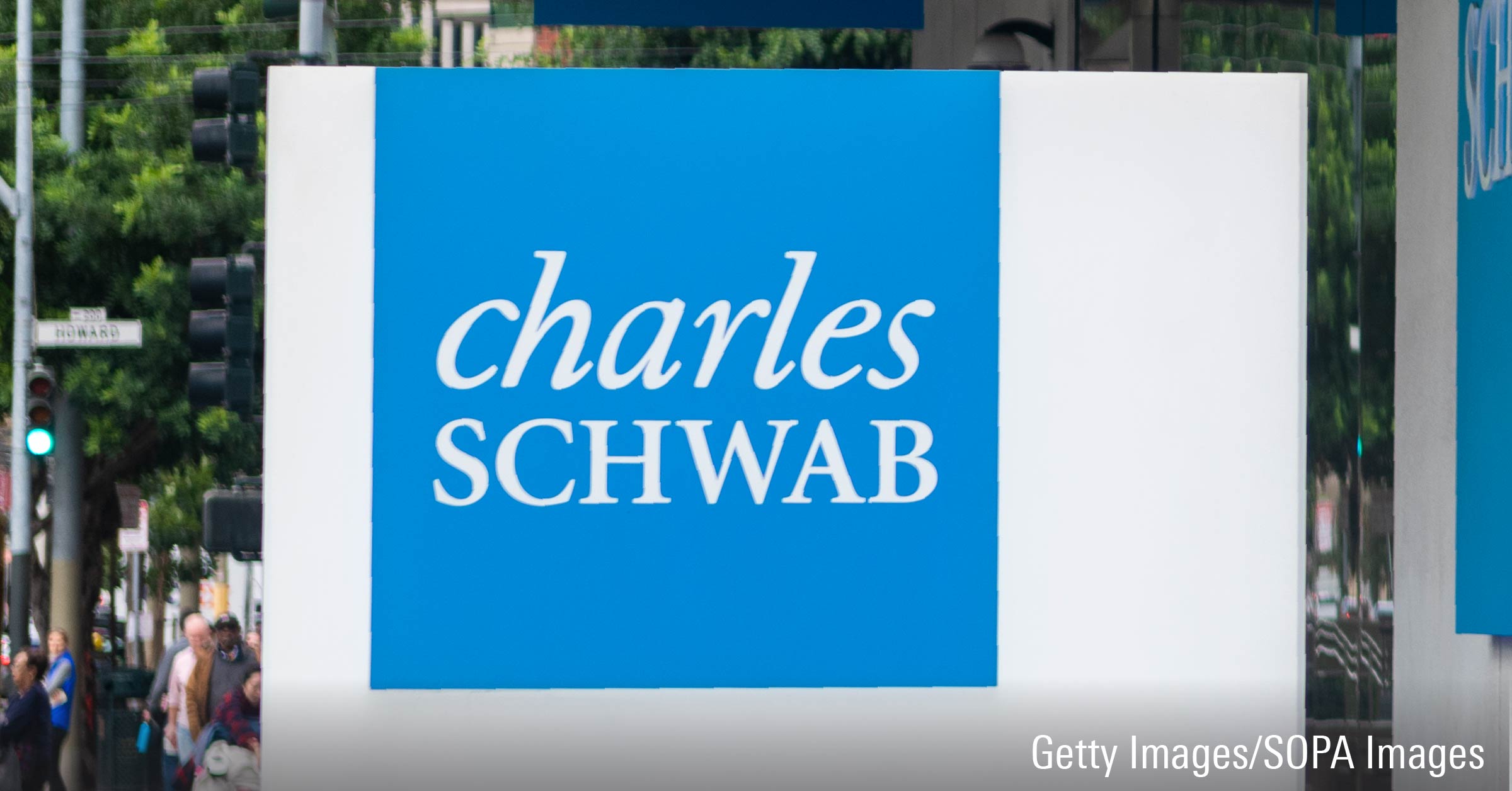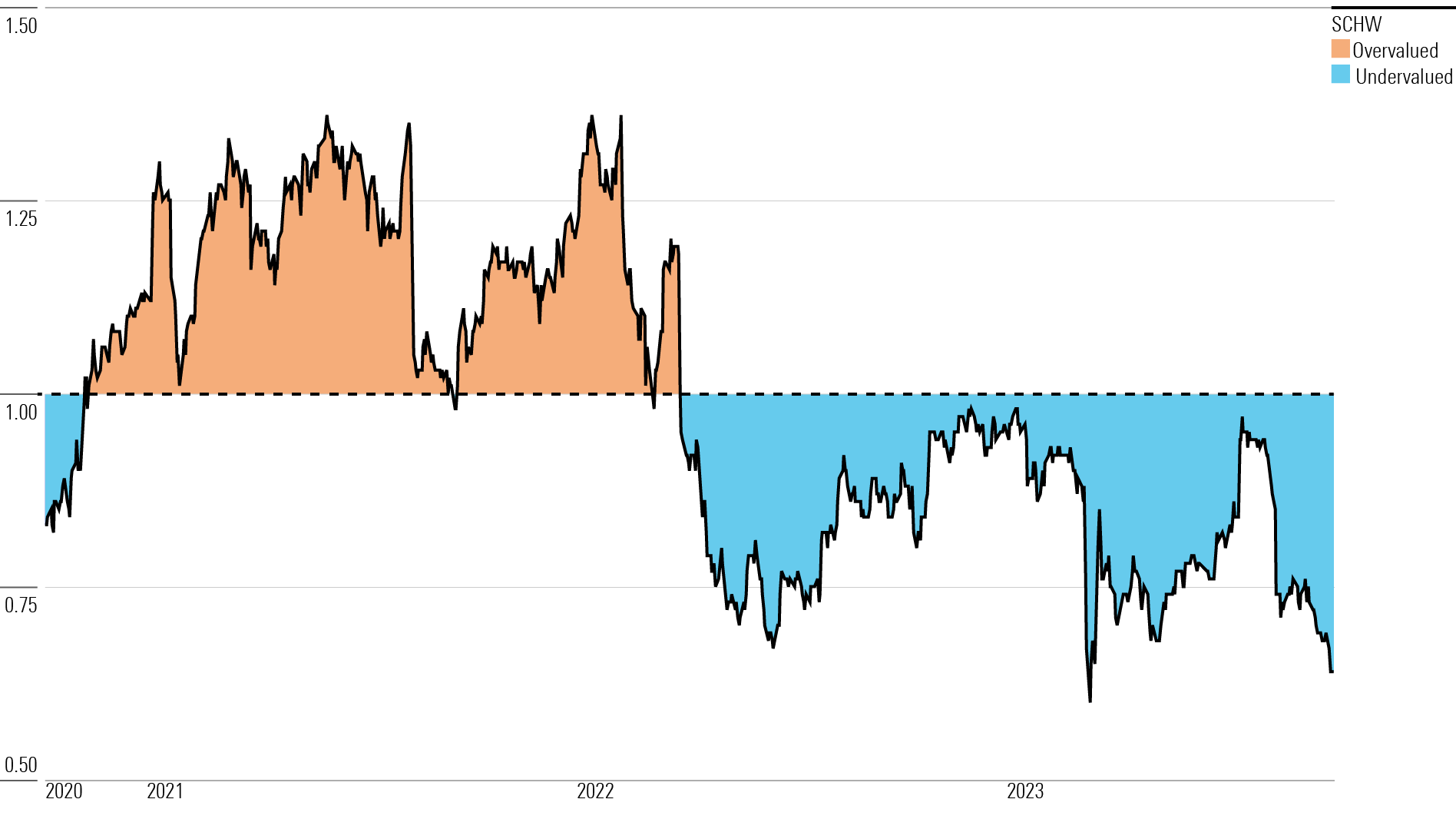Going Into Earnings, Is Charles Schwab Stock a Buy, a Sell, or Fairly Valued?
Amid falling bond prices and rising funding costs, here’s what we think of Schwab’s stock.

Charles Schwab SCHW is set to release its third-quarter earnings report on Oct. 6, before the market open. Here’s Morningstar’s take on what to look for in Schwab’s earnings and stock.
Key Morningstar Metrics for Charles Schwab
- Fair Value Estimate: $80.00
- Morningstar Rating: 4 stars
- Morningstar Economic Moat Rating: Wide
- Morningstar Uncertainty Rating: High
What to Watch for In Schwab’s Q3 Earnings
There are both environmental and company-specific issues that will negatively affect Schwab’s third-quarter results, but we still believe the market is overreacting and that shares are undervalued after the recent selloff.
Two major drivers of earnings for investment service companies are asset prices and interest rates. Both equity and bond prices have recently taken a hit, with the Morningstar US Market Index down over 7% and the Morningstar US Core Bond Index down 4% since the end of July, which means lower client assets.
While the effective federal-funds rate has only moved from an average of 5.08% in June to an average of 5.33% in September, the 10-year U.S. Treasury yield moved from 3.81% at the end of June to over 4.7% in recent days. Schwab, along with many banks, should report a significant increase in unrealized losses on its fixed-income securities due to interest rate risk in its bank portfolio.
Thankfully, Schwab’s fixed-income portfolio is primarily composed of U.S. Treasuries and agency mortgage-backed securities that have virtually no credit risk, so the losses won’t be realized as long as the company holds the securities to maturity. Schwab should also be able to hold the securities to maturity because of the Federal Reserve’s Bank Term Funding Program and other sources of liquidity. Additionally, regulatory capital ratios should be fine, as unrealized losses aren’t currently included in the company’s capital calculation. However, we do imagine the market will feel unease with the company’s low tangible common equity balance on a GAAP basis, and believe management should reassure investors about Schwab’s capital position and access to liquidity.
The trends we observed after Schwab released its August 2023 monthly metrics—lower net client inflows because of the attrition of TD Ameritrade assets, money market fund balances increasing, and certificate of deposit balances probably not decreasing as much as hoped—will show up in third-quarter results.
According to Morningstar Direct, net flows into Schwab’s money market funds decreased from August to September but were still higher than in June and July. Money market fund flows are a useful proxy for “cash sorting,” or how much clients may be moving their cash from low-yielding deposit accounts into higher-yielding products, such as certificates of deposits and money market funds. The decrease in low-yielding deposit balances and increase in high-cost supplemental funding balances have pressured the company’s earnings and net interest income, or NII.
Movements in stocks can often be ascribed to whether results are better or worse than expected, and some of the recent decreases in Schwab’s share price may have been from management giving the impression that usage of high-cost supplemental funding in reaction to cash sorting had already peaked, while recent data hints that cash sorting hasn’t stopped yet.
We do think it is worth noting that August and September flows into money market funds may be elevated because clients reallocated some of their portfolios to safer assets as equity markets fell in those months. Additionally, monthly money market net flows are still quite a bit lower than in the fourth quarter of 2022 and the first quarter of 2023, which probably means most cash sorting has likely already occurred.
More broadly, we continue to believe that we are near the end of the cash sorting cycle and that Schwab’s cash inflows should more than offset cash sorting in the next couple of quarters, which should lead to material increases in NII as the company reduces its use of high-cost supplemental funding.
Charles Schwab Stock Price
Fair Value Estimate for Charles Schwab Stock
With its 4-star rating, we believe Schwab’s stock is undervalued compared with our long-term fair value estimate of $80.00.
In the medium term, we forecast a 7% compound annual growth rate for net revenue, as trading revenue flattens, client assets increase at a 10% rate from recent bear market lows, and deposits increase after cash sorting headwinds subside in 2023. Much of the revenue growth is attributable to NII from the resumption of deposit growth and reinvesting of maturing fixed-income proceeds.
We project asset-management revenue increasing at a normalized 4%-6% compound annual growth rate. The growth is from the overall increase in client assets and the movement of client cash into money market funds, partially offset by pricing cuts.
We value Schwab at $120 per share in our upside scenario and $42 per share in our downside scenario, which corresponds to a 2024 price/earnings ratio of 25 times in the upside case and 23 times in the downside case. The main drivers of the difference in valuation between these scenarios are the normalized levels of interest rates, asset levels, and operating margins.
Read more about Charles Schwab’s fair value estimate.
Schwab Historical Price/Fair Value Ratio

Economic Moat Rating
We assign Schwab a wide moat, arising from its massive scale and industry-leading cost efficiency. We believe the company could endure severe competitive pressures and still earn above its cost of capital.
Schwab’s low costs and large client base give it the flexibility to create products with value propositions comparable or superior to those of its peers—products that it can ramp quickly. While a relative latecomer to creating its own exchange-traded product line, Schwab is now among the top 10 largest exchange-traded fund companies by assets. Its new online advisory platform will also benefit from its low cost and client reach, which will enable the firm to be more profitable than existing players and leapfrog them in assets.
Charles Schwab Bank is one of the largest banks in the United States, with more than $300 billion in deposits at the end of 2022. It has low operating costs because of its synergy with the company’s brokerage business. Credit costs are also low, as much of the bank’s portfolio is in low-risk agency mortgage-backed securities, and loans are primarily made to the company’s relatively affluent clients.
Read more about Charles Schwab’s moat rating.
Risk and Uncertainty
We assign Schwab a High Morningstar Uncertainty Rating.
Major risks to Schwab include the future of interest rates, a decrease in deposits, and fee pressures. Interest rates are the key driver of the company’s earnings over the next several years. Due to the staggered reinvestment of the company’s portfolio, interest rates have to remain at a high level for the company’s investment portfolio to fully reprice.
In a recession with accommodative monetary policy, portions of the company’s investment portfolio could be stuck at a lower rate. Asset-management revenue could also come under pressure, but it’s likely to be more from a shift in asset mix to passive investment products from the company’s proprietary and Mutual Fund OneSource products, which have higher revenue yields.
Read more about Charles Schwab’s risk and uncertainty.
SCHW Bulls Say
- Charles Schwab is solidifying its position as a leader in investment services, and it may be able to expand into other financial services.
- Merging with TD Ameritrade will come with material revenue and expense synergies that will be realized over the next couple of years.
- Schwab’s scalable and vertically integrated business model should enable it to convert an increasing percentage of revenue into earnings and be in the better parts of the value chain as the investment services industry evolves.
SCHW Bears Say
- A loss of deposits and higher funding costs are potential near-term negatives for the firm.
- While Schwab has the resources to adapt, financial technology innovation has increased in recent years and could disrupt parts of the investment services industry. $0-commission business models and robo-advisors are recent trends that challenged the status quo.
- A Europe- or Japan-like scenario of near-0% interest rates for an extended period would significantly reduce earnings and likely necessitate a change in business model. The Fed may have to lower interest rates if a recession occurs.
This article was compiled by Brendan Donahue.
Earnings Season: What to Expect
The author or authors do not own shares in any securities mentioned in this article. Find out about Morningstar’s editorial policies.

/s3.amazonaws.com/arc-authors/morningstar/75bbf764-3b6f-4f5a-8675-8f9488c74c04.jpg)
/cloudfront-us-east-1.images.arcpublishing.com/morningstar/347BSP2KJNBCLKVD7DGXSFLDLU.jpg)
/cloudfront-us-east-1.images.arcpublishing.com/morningstar/TP6GAISC4JE65KVOI3YEE34HGU.jpg)
/d10o6nnig0wrdw.cloudfront.net/04-29-2024/t_d0e8253d77de4af9ae68caf7e502e1bf_name_file_960x540_1600_v4_.jpg)
:quality(80)/s3.amazonaws.com/arc-authors/morningstar/75bbf764-3b6f-4f5a-8675-8f9488c74c04.jpg)